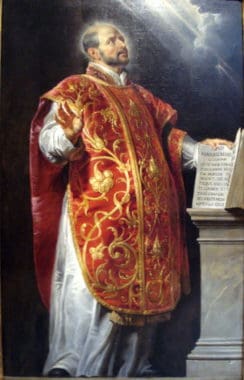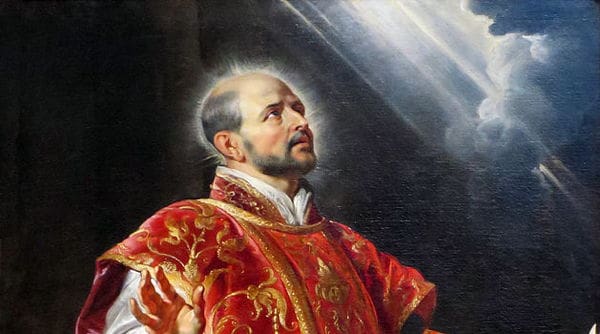Editor’s Note: Today, we are honored to introduce to you Father Angelo Geiger, who has written extensively on Marian theology and spirituality, and has been published in such publications as “Inside the Vatican” and “Catholic World Report” (online). We are particularly pleased to note that he is our first writer out of the Franciscan tradition. We are blessed he has agreed to write for us. Please welcome him warmly and make him feel at home!
Thinking with the Church — Mysticism and Magisterium (Part I of VI)
In his Spiritual Exercises, St. Ignatius of Loyola set down eighteen rules for “thinking with the  Church” that are fundamental to the discernment of spirits. The Latin phrase sentire cum Ecclesia, “to think with the Church,” succinctly identifies the truly Catholic state of mind. Christ and His Church possess “the same Spirit which governs and directs us for the salvation of our souls.” The Catholic possesses the mind of Christ when he or she thinks with the Church.
Church” that are fundamental to the discernment of spirits. The Latin phrase sentire cum Ecclesia, “to think with the Church,” succinctly identifies the truly Catholic state of mind. Christ and His Church possess “the same Spirit which governs and directs us for the salvation of our souls.” The Catholic possesses the mind of Christ when he or she thinks with the Church.
This is because the Church is the body of Christ and is never separated from its Head. The sacramental life of the Church was born from the side of Christ on the cross, and at Pentecost the Spirit of Christ made Himself present in the fullest possible way in the midst of the Twelve. Christ is present in history through the Church He established while He was still on earth. He said to the Apostles, the twelve foundation stones of the Church, he who hears you hears Me (Lk 10:16).
I begin this series on Mysticism and Magisterium with the notion of “thinking with the Church” because discernment is so basic to the spiritual life. For a Catholic, every authentic spirit is characterized by its “ecclesiality,” which means that the Holy Spirit works in and through the Church and always leads to communion with the Church.
In recent years, the sacred magisterium has frequently recommended the sentire cum ecclesia in order to remind us that a true sense of faith implies “a profound agreement of spirit and heart with the Church” (Donum Veritatis [DV] 35). One’s personal faith must be the faith of the Church. It is “never an isolated act” of an individual or even a group within the Church. In fact, St. John Paul II told religious that by thinking with the Church they become “experts of communion,” and “architects” of God’s plan for unity within the Church (Vita Consecrata [VC] 46). We are one with Christ because we are of one mind and heart through our communion with the Church.
This ecclesiality runs directly contrary to the modern religious spirit, which is the worship the autonomous personal conscience. Most often today this radical autonomy takes the form of personal moral relativism, which is a private disregard for what the Church teaches, say, for example, in regard to its condemnation of contraception. More serious, however, is public dissent from Church teaching, especially by well-known figures, whose scandal harms the unity of the Church in a profound way.
Unfortunately, it is not only the progressives who have adopted this individualistic spirit. Even in the name of Tradition, some today speak of a pre- and post-conciliar Church, thus creating a rupture between the past and the present. In this way, they submit everything the magisterium has to say to a test that ultimately sets the Church against itself.
Finally, the autonomous personal conscience sometimes lays claim to a false discernment when it sets private revelation and presumed personal graces against the magisterium. The desire for union with God sometimes leads individuals to attach themselves to extraordinary manifestations of the “spirit,” but in such a way that weakens their attachment to the Church. Thus, Catholics continue to embrace New Age spirituality, or some dubious private revelation, or a personal insight even though they know that their conviction runs contrary to Church teaching or discipline.
The discernment of spirits is so important today because there are many voices competing for our attention, and it is all so easy to assume that that what we hear, or even what we think and say comes from God. We need to be careful, especially when we are tempted to think differently than the Church–to disregard or disparage her doctrine or choose a path that sets us at odds with the sacred magisterium.
Over the course of this series, I hope to show why an ecclesial faith is so important to the spiritual life and to point out a safe path for those to follow who may be tempted, for whatever reason, not to think with the Church.
+
Editor’s Note: A listing of all the posts in the “Mysticism and Magisterium” Series can be found here.
Art: St. Ignatius of Loyola, Peter Paul Rubens, 1610-1612, PD-US, Wikimedia Commons.


